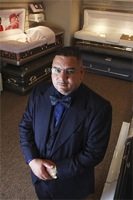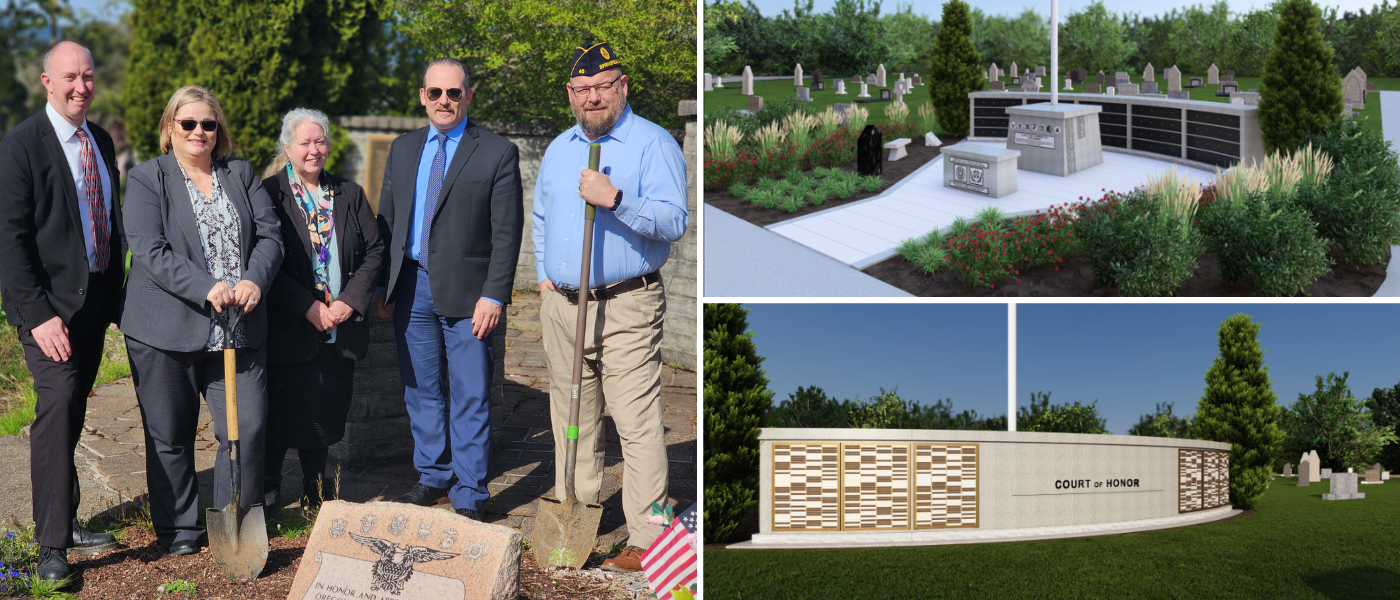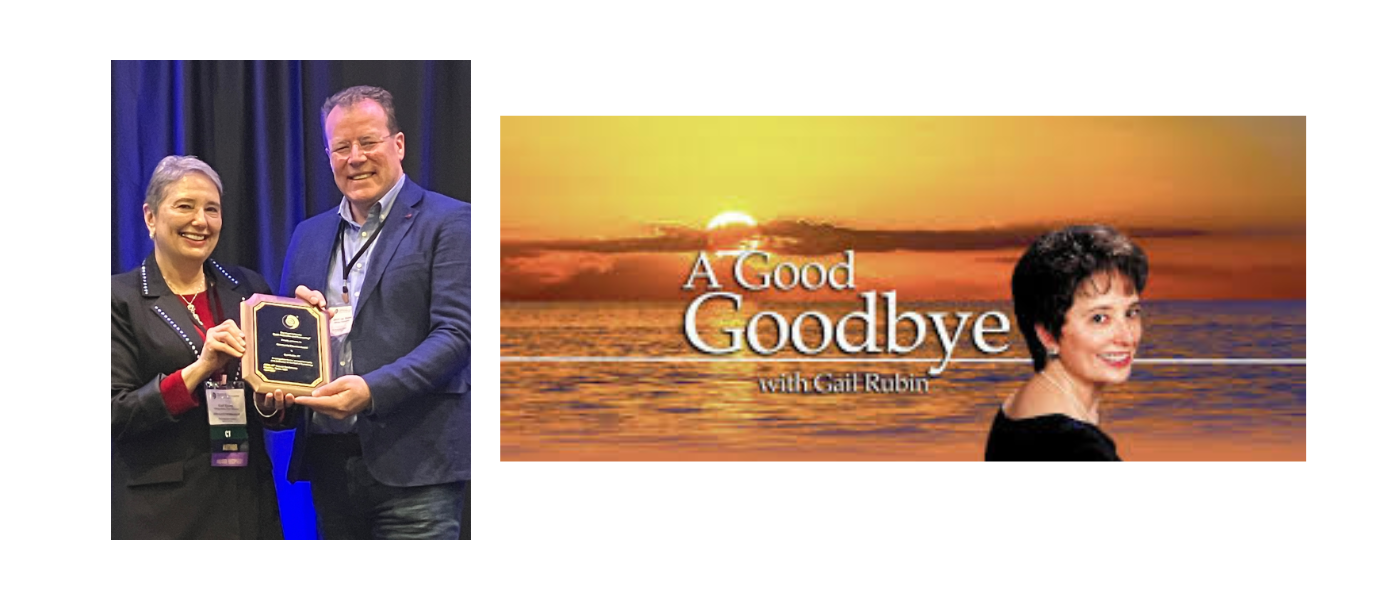At Golden Gate Funeral Home, Bodies Are John Beckwith Jr.?s Business, And Business Is Booming
 John Beckwith Jr. walks into his morgue and over to the new corpse. His colleagues and pastor follow him inside, still talking from lunch. The air in the morgue stirs and rattles a paper sign taped to a door that reads, “Where excellence is standard and only perfect is acceptable.”.
John Beckwith Jr. walks into his morgue and over to the new corpse. His colleagues and pastor follow him inside, still talking from lunch. The air in the morgue stirs and rattles a paper sign taped to a door that reads, “Where excellence is standard and only perfect is acceptable.”.
Beckwith will evaluate the condition of the body. They all know the man on the table. He went to their church. Last night he died in a motorcycle wreck. Now his right eyelid is missing, and where his lower leg should be are instead splinters of bone.
“I’m going to recommend the family does not see the body,” says Beckwith, an obvious observation that lightens the mood. To Beckwith, the 42-year-old in charge of Golden Gate Funeral Home, the business his father founded, an “even-keeled spirit” is essential to his work.
The Beckwith family operation is one of the biggest funeral homes in Dallas and the busiest black funeral home in the Southwestern United States. This year, they’ll bury or cremate some 2,000 bodies?a number that includes 100 from a new Louisiana location run by a cousin. “That’s big, monstrous,” says Bob Duncan, a longtime funeral home supplier who sells to 50 other funeral homes in the Dallas area.
His father, John E. Beckwith Sr., opened his Dallas business in 1985 inside a two-story house nestled in a historically black neighborhood in Oak Cliff. His first year in business, he handled fewer than 200 cases, but he had a plan: He would serve the neediest people in his community and treat them with respect regardless of income. His generosity and habit of throwing in free limousines for families is still talked about in the community. For Beckwith Sr., who grew up poor in rural Louisiana, his business model was fueled by memories of the shoddy treatment his family received from a Dallas funeral home when his mother passed away long ago.
Inside the morgue, an embalmer takes the deceased’s head and turns it right and then left. The neck is broken. The body is a mess, but Beckwith figures that if it’s cleaned, the wife might be able to view it, at least through photographs.
“Let’s go ahead and see if we can get him embalmed,” Beckwith says. The embalmer steps toward a machine that sits high on a shelf and looks like a jug filled with pink goo with a tube coiled around its base.
A morgue is a worst-case scenario for the claustrophobic. Bodies are lined up against the wall, underneath sheets. Rows of feet point outward, so to walk anywhere you must negotiate a narrow aisle lined by the bottoms of yellowed feet with tagged toes. It smells of iron mixed with preserving fluid. It’s very cold.
“Give me some digital photos from different angles for the family,” Beckwith says. “I don’t think she’s going to be able to see it.” In the end, she will view the body.
Beckwith employs a team of 65 people who share a curious fascination with the death business, most of them since they were children. The embalmer, for example, started helping out in funeral homes before he turned 10.
Beckwith says the business can grow bigger still by figuring out new ways to service people better. Fancy cars are important. Golden Gate owns a fleet of 33 white limousines, stretch Cadillacs, Chryslers, Lincolns, Mercedes and now a Bentley. He placed an order for the nation’s first stretch Hummer-hearse to appeal to the younger set, which is a significant part of his business.
Many of the youths he buries died violently. In Dallas, as in other big cities, the majority of homicide victims are young, black males. He says it’s his obligation to serve them, so he covers costs with reimbursements from the Texas Attorney General’s Crime Victims Compensation Fund, which pays out a maximum of $4,500 for burial and funeral costs. That’s more than $1,000 under Beckwith’s average price. Some police officers say privately that some local funeral homes game the system, collecting the maximum reimbursement from the state while providing minimal service to poor families. But other funeral homes often refer homicide cases to Golden Gate because there’s not usually a lot of money in them.
There are also the crowds to consider. Many evenings, if you drive by Golden Gate on Stemmons, the lot in front will be packed with cars and young people hanging out, leaning on cars, playing music. It sometimes looks like a nightclub. Beckwith is expanding the work of his father to create a brand, hoping to make Golden Gate synonymous with funerals beyond the black community. He has big ambitions to reach out to the rest of the city, black and white. He took his message to television in July with Ask the Undertaker, a program on public access channel 34 on Saturday nights. He hosts the same show, a hybrid sort of infomercial that blends selling with spirituality, on the radio from the studios of KHVN-970 AM “Heaven 97,” Dallas’ No. 1 black gospel station.
High volume, moderate prices and an emphasis on customer service?these are hallmarks of successful retail businesses, so it’s not hard to understand how Beckwith’s funeral home has reached its “monstrous” size.
“Look at the Walmarts,” says James Shoemake, president of Dallas Institute of Funeral Service, where five Beckwith family members have either attended or are enrolled. “They’re trying to provide funeral services for the masses…Their key to success is funerals for everybody.”
But once a business becomes “monstrous,” how can it keep its promise to give individuals, even the neediest, service and attention?
For Golden Gate, the answer lies in the drive and passion of John Beckwith Jr.
When Beckwith Jr. took over as Golden Gates’ chief executive after his father had a stroke, he built a new, larger facility off Stemmons Freeway that could handle the volume of his dreams. That was three years ago, and so far the extra space has allowed him to double his cases.
Beckwith has the same light skin, round face and thin mustache as his father. His suit is custom-tailored to accommodate the .45-caliber Glock pistol he keeps in his trousers pocket. He wears shoes made of crocodile hide, some with a pair of yellow marbles mimicking the croc’s eyeballs. His name is inscribed in script on the cuffs of his jacket?”John” on the right, “Beckwith” on the left?and on the back of the collar.
His dream since he was a kid was to build the funeral home for greater Dallas. “I always thought it had to be very large because we’re gonna bury everybody in Dallas…I want everybody,” Beckwith says. “I want ’em all.”
But Beckwith has a lot of work to do before he gets there. Despite his high numbers, many people don’t know about Golden Gate, especially outside of the black community. Last year he buried fewer than 250 people who weren’t black.
So Beckwith approaches each new case the way his father did. He makes sure the family leaves happy, regardless of their income. The fastest way to lose work is to mistreat a family. They will never come back.
The morning after the motorcycle victim arrived, Beckwith parks in the company spot reserved for the CEO. He throws back the high wooden entrance doors and is welcomed by his three staff “greeters,” an idea he got from Walmart.
His office is behind the first door inside the building. It’s dim inside with ornate furniture and comfortable leather chairs. With an “open-door policy,” he’s never alone, and the office would be more appropriately called the executive hangout. On his right is the “wall of fame,” his staff teases, which is full of framed photographs of his family with cultural figures and entertainers, including Martin Luther King III, Al Sharpton and Alicia Keys. There’s also a newspaper clipping from the late ’70s when his mother was shot and injured during a robbery at a 7-Eleven.
His personal assistant, a young woman who is an apprentice funeral director, stands next to his desk and tells him where he needs to be this morning. Two families are each waiting for him in separate conference rooms. The first is a homicide viewing; the second is a customer complaint.
At the entrance to the first conference room, he opens the door carefully, as if an infant were sleeping on the other side. He may be dressed in a custom-tailored suit and crocodile hide shoes, but when he enters the room where the grieving family waits, he is quiet and stays out of the way. To be an undertaker, he says, “you have to be a servant, no matter how much money you make or the popularity you get.”
Beckwith knows this family, but he doesn’t greet the father. He speaks to the sister of the homicide victim in a low voice, and she leans toward him to hear. Then the sister, Sekethia Barton, tells the family the viewing room is ready. Beckwith leads the way at a quick pace down another carpeted hall, passing by other viewing rooms, some occupied.
The father is last to follow. His wrist and hand start to shake in the arm of another family member who pulls him along. In the room, a photo slideshow plays on the TV to the R&B classic “It’s So Hard to Say Goodbye to Yesterday.”
Anonymous callers often phone in all day whenever there is a wake scheduled for a homicide victim. The callers invariably warn of a retaliation killing and to have cops on hand. For the wake of today’s homicide victim, Beckwith has already received three such calls.
Once everybody is inside with the open casket, Beckwith asks the sister if everything is all right. He then asks that everybody hold hands and pray. He backs out of the room with his hands clasped and head bowed.
Spirituality plays an enormous role in Beckwith’s business, and he reassures the grief-stricken with a spiritual touch that he’s perfected over the years. He likes to touch everybody in the room when he first enters, to communicate to them physically and mentally that he is here to help. “The touch lets you feel my spirit, and I feel yours,” Beckwith says. “I want to interchange those spirits.”
Beckwith believes the Holy Ghost and spirits surround us. Not human spirits, but good or evil spirits that can control you and sometimes cause you to do wrong.
When it is time to meet the family with the complaint, he knows a mother inside the conference room is unhappy with how her son looked in the open casket in the viewing room. The body has been taken back to the make-ready room for a touch-up. He decides to first check on the body.
Beckwith’s cousin, Michael Beckwith, head of the new Golden Gate home in Tallulah, Louisiana, is at work on an older male inside a casket. This is the problem corpse. Michael steps back to show Beckwith the face. The man is dressed in a suit. His lips are cracked and large. Michael hands over an enlarged photo of the man in life. The corpse looks nothing like the man in the photograph. “What people don’t realize is it doesn’t take long for a body to change,” Beckwith says, looking from the photo to the corpse.
Michael returns to the task. He cuts away fat from behind the lip and cheek with surgical scissors. He pulls out the pieces and puts them in a ziplock bag stuffed with other foreign-looking clippings. “It’s like liposuction, but here we put it in a bag,” Beckwith says. Then the bag gets hidden somewhere inside the casket because he feels it’s immoral to throw away body parts. Michael thinks he needs about 20 minutes to fix up the body. So Beckwith leaves to introduce himself to the upset mother.
He opens the door to another conference room and sees three people seated around a small round table. The older woman in an African-style long gown and short haircut speaks first. Her granddaughter is supposed to be bringing the flowers to put on top of the casket, but she hasn’t yet arrived. The funeral home had set up the casket in the viewing room without any flowers. “I didn’t want the casket to be naked there,” she says. She’s clearly frustrated.
Beckwith gets down on one knee beside her, and as they look over the paperwork together, rests his hand on her shoulder. The woman mistakes this gesture for him assuming she can’t read the document by herself. “It’s my job to walk you through it,” he explains.
Beckwith says they will put a spread on the casket for now, and when her granddaughter arrives they will swap it out, for no extra charge, and asks her if that will be all right. Yes, but what about his looks? She wants Beckwith to do something about his lips and cheeks that are too large, and his skin that is too dark.
“I don’t want to be difficult, but I’m just trying to…”
Beckwith is standing now and rests his hand on her shoulder. “You have a beautiful spirit,” he says. “You’re definitely not difficult. Yes, ma’am.”
She wrinkles her eyebrows and smiles.
“I’m an old lady, and I don’t have it together,” she says. Her tone has changed.
Beckwith says he’s going to replace the white shirt, which he understands had some makeup smudges. He’ll lighten him up a bit too. “He was dark, but he wasn’t that dark,” she says.
“Yes, ma’am, and thank you for putting your trust in us.”
He is now taking long, purposeful strides back to the morgue. “Funeral business,” he says, punching in the code to the morgue. “Got to love it.” As he approaches Michael, he says, “Let’s see how Mike’s coming along. See if he’s going to make me look like a hero!”
The body is looking better, but Michael is still at work.
Beckwith seems to get lost in an anxious thought as he watches Michael work. He forgets his posture, and his face shows distress.
“If it’s not perfect,” he says, “it really bothers me.”
Beckwith gets some other men on staff to help him lift the body for the final touches. He has two men grab the corpse by the arms and pull him up. He fits two Styrofoam blocks under his back to prop him higher. The body has slid down too far. Michael wraps his finger tips under the jowls and pulls the body toward him. Beckwith adjusts the pillow so it looks soft. Beckwith grabs a lint brush and rubs down the jacket. “You all see anything?” he says, stepping back from the casket with the lint brush in his hand. “It needs to be perfect when we bring it back out.” Beckwith points with his free hand to the body’s middle. “Clasp his hands.”
On the third try, Michael gets them to stay together, one hand resting over the other. “Let’s roll him out,” somebody says.
As it turns out, there’s a reason the mother thought her son looked different in the casket than in life. The son died while he was incarcerated, and the mother hadn’t seen him for a long time. This revelation makes Beckwith feel better about the original work, but it doesn’t affect how he treats the family.
Click Here For Rest of Article
Source: Dallas Observer
Photo By: Kimberly Thorpe




